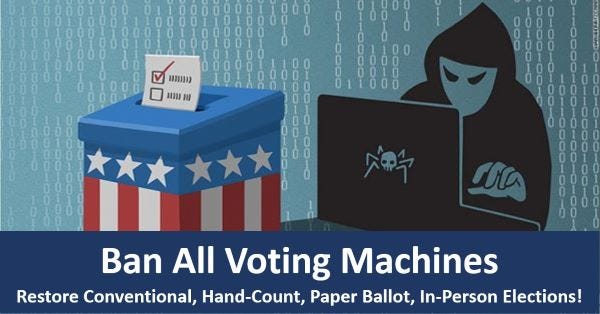As the 2024 election approaches, the Federal Bureau of Investigation (FBI) has issued an alarming warning about potential threats to state election systems.
In a recent report by the Epoch Times, Tim Langan, the executive assistant director for the Criminal, Cyber, Response, and Services Branch of the FBI, described the situation as "extremely alarming." The primary concern revolves around the vulnerability of voter databases to hacking through phishing or ransomware attacks. Additionally, officials highlighted the rising use of artificial intelligence (AI) to manipulate and potentially deceive voters.
Eric Goldstein, the executive assistant director for cybersecurity at the Cybersecurity and Infrastructure Security Agency (CISA), emphasized the challenging cybersecurity environment, pointing out significant advancements that could empower nations like China, North Korea, and Russia to target U.S. election systems. The heightened risk, according to Goldstein, applies to every location, regardless of size or sector.
The report also touched on alleged foreign threats, with CISA warning of Chinese Communist Party (CCP) state-sponsored cyber actors seeking to position themselves for potential cyberattacks against U.S. critical infrastructure. Notably, a CCP-backed group known as Volt Typhoon was reported to have compromised various U.S. agencies.
The article highlighted an alleged cyberattack in Fulton County, Georgia, and ransomware attacks on local governments in Missouri, Pennsylvania, and Colorado as additional examples of the growing cybersecurity concerns.
While FBI Director Chris Wray and NSA Director Paul Nakasone expressed confidence in the upcoming general election, the report raises questions about the coordination between the FBI and the Cybersecurity and Infrastructure Security Agency (CISA) in addressing these pressing threats.
Voting Machines Unconstitutional?
As highlighted in our recent post, 'Voting Machines Unconstitutional?', cybersecurity expert J. Alex Halderman conducted a courtroom demonstration that laid bare the alarming vulnerability of electronic voting systems, including Dominion, to virtually undetectable election tampering. In a mere 5 minutes, Halderman executed a machine hack, overriding coding, and swapping votes, vividly illustrating the ease with which these systems can be compromised. His stark warning to U.S. senators resonated: 'I know America’s voting machines are vulnerable because my colleagues and I have hacked them—repeatedly—as part of a decade of research studying the technology that operates elections and learning how to make it stronger.'
J. Alex Halderman has conducted hacking demonstrations before Congress and the State Department for years, proving that none of our policies, procedures, or cybersecurity efforts have successfully secured any election voting machines, tabulators, or other related equipment.
Colonel (Retired) John Mills, a seasoned veteran in senior positions within the Department of Defense and a cybersecurity law and policy professor at the University of Maryland, has testified about the evolving landscape of cyber threats to election infrastructure. Col. Mills emphasizes that the capability for "remote access operations" to infiltrate computer networks without detection has significantly expanded since the 1980s. While the U.S. Government conducts such operations, other countries, organizations, and individuals have also developed varying degrees of sophistication in this domain, notably China, Russia, Iran, North Korea, and Venezuela. Col. Mills highlights that these capabilities, once confined to classified environments, have now proliferated into the public domain.
Contrary to federal assertions about the 2020 election being the "most secure in American history," Col. Mills contends that these claims have "little, if any, basis in fact."
He points to substantial deviations from the standards for free and fair elections, particularly regarding the operation of election machines and technology. After scrutinizing evidence related to the election equipment used in Mesa County, Colorado, for the 2020 election, Col. Mills identifies patterns consistent with known cyber intrusions, breaches, and compromises conducted by sophisticated actors, likely at the nation-state level. Election cybersecurity experts have been touring and giving testimony in numerous state hearings nationwide, advising that all US electronic election systems are easily hackable remotely or in person if a machine is plugged into a wall.
A National Security Emergency! Voters must rally and implore their state legislatures to transition back to conventional hand-counted elections, thereby putting an end to the current election security nightmare.
Simplicity of Hand Count Elections







The best strategy for free and fair elections is to have watermarked paper ballots and hand counted on a local precinct level. It was done in Arkansas, Missouri and even California!